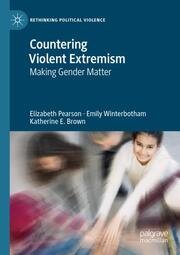Detailansicht
Countering Violent Extremism
Making Gender Matter, Rethinking Political Violence
ISBN/EAN: 9783030219642
Umbreit-Nr.: 5036652
Sprache:
Englisch
Umfang: xvii, 348 S., 5 s/w Illustr., 348 p. 5 illus.
Format in cm:
Einband:
kartoniertes Buch
Erschienen am 16.02.2022
Auflage: 1/2020
- Zusatztext
- This book presents original research on gender and the power dynamics of diverse forms of violent extremism, and efforts to counter them. Based on focus group and interview research with some 250 participants in Canada, France, Germany, the Netherlands and UK in 2015 and 2016, it offers insights from communities affected by radicalisation and violent extremism. It introduces the concept of gendered radicalisation, exploring how the multiple factors of paths to violent extremist groups - social, local, individual and global - can differ for both men and women, and why. The book also offers a critical analysis of gender and terrorism; a summary of current policy in the five countries of study and some of the core gendered assumptions prevalent in interventions to prevent violent extremism; a comparison of Jihadi extremism and the far right; and a chapter of recommendations. This book is of use to academics, policy-makers, students and the general reader interested in better understanding a phenomenon defining our times.
- Kurztext
- This book presents original research on gender and the power dynamics of diverse forms of violent extremism and efforts to counter them. Based on focus group and interview research with some 250 participants in Canada, France, Germany, the Netherlands and UK in 2015 and 2016, it offers insights from communities affected by radicalisation and violent extremism. It introduces the concept of gendered radicalisation, exploring how the multiple factors of paths to violent extremist groups - social, local, individual and global - differ for both men and women, and why. It highlights some of the core gendered assumptions prevalent in interventions to prevent violent extremism and makes suggestions for how to improve policy. The book also offers insight into current definitions of violent extremism; a critical analysis of gender and terrorism; a summary of current policy in the five countries of study; a comparison of Jihadi extremism and the far right; and a chapter of recommendations. This book will be of use to academics, policy-makers, students and the general reader interested in better understanding a phenomenon defining our times. Elizabeth Pearson is Lecturer at Swansea University and Associate Fellow at the Royal United Services Institute, UK. She specialises in gender in extremism and counter extremism in the UK, Europe and West Africa. Emily Winterbotham is Senior Research Fellow at the Royal United Services Institute, UK, and a Deployable Civilian Expert for the UK Government's Stabilisation Unit. Previously, Emily worked as a Political Adviser to the European Union Special Representative to Afghanistan. Katherine E. Brown is Senior Lecturer at the University of Birmingham, UK, and focuses on the role of religion and gender in violent extremism and counter extremism. Katherine has a particular interest in the gendered impacts of state responses on the human rights of religious communities.
- Autorenportrait
- Elizabeth Pearson is Lecturer at Swansea University and Associate Fellow at the Royal United Services Institute, UK. She specialises in gender in extremism and counter extremism in the UK, Europe and West Africa. Emily Winterbotham is Senior Research Fellow at the Royal United Services Institute, UK, and a Deployable Civilian Expert for the UK Government's Stabilisation Unit. Previously, Emily worked as a Political Adviser to the European Union Special Representative to Afghanistan. Katherine E. Brown is Senior Lecturer at the University of Birmingham, UK, and focuses on the role of religion and gender in violent extremism and counter extremism. Katherine has a particular interest in the gendered impacts of state responses on the human rights of religious communities.
